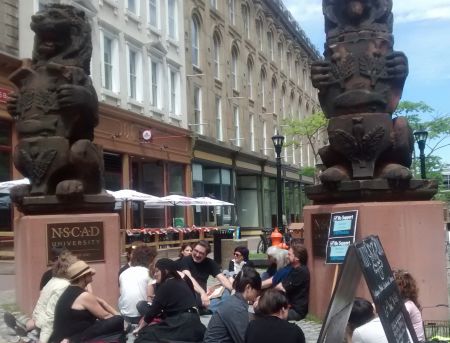KJIPUKTUK (Halifax) - On Wednesday, 17 members of NSCAD’s custodial and administrative staff were told that their positions with the university had been eliminated.
The scale of the layoffs is unprecedented, says NSGEU President Joan Jessome, comprising roughly half of the union branch, many of whom had been working at NSCAD for decades. “You take [that many] employees out of a workplace of that size, that’s significant.”
In a statement released Wednesday, NSCAD’s President, Dianne Taylor-Gearing, said that custodial services would be contracted to an external agency.
But this rings alarm bells for Jessome; although the laid-off custodial staff would in theory be able to apply for their former positions, they’d most likely be applying to do the same job with lower pay and no benefits. “I think that availability is there but…it’s unlikely that they would do that,” she says. “It’s just an insult“
Those who were laid off aren’t the only ones who will be affected by the change. Although the President’s statement said the ‘reorganization’ was aimed at improving student attraction and success, some NSCAD students are worried that an important part of their educational experience has been lost.
Laura Baker-Roberts, a NSCAD student and one of the organizers of a lie-in of students, faculty and staff on the pavement in front of NSCAD’s lions on Thursday, says that because NSCAD is a small community, the impact will inevitably reverberate through the whole institution.
"The people that they chose to layoff are really the backbone of our institution, they’re the people that deal with students on the front lines, everyday… I know a lot of these people personally and to watch them lose their jobs in the way that they did, is so disheartening.”
NSCAD has written that the layoffs will save the university $430,000, and is part of a strategy that will allow the university to proceed with a balanced budget. NSCAD’s operating budget for 2014 – the most recent data available - was $18,919,225.
But those savings have a cost for everyone, including faculty, says Dr. Max Haiven, assistant professor of Art History and Critical Studies at NSCAD.
The administrative staff whose positions have been eliminated provided critical support to faculty, he says, including the compilation of ‘coursepacks’ for students. That will now be the responsibility of professors. “Even though management had told us this won’t happen, a lot of work is going to be downloaded onto us.”
This is especially problematic for part-time, contract faculty, who do the majority of the teaching at NSCAD. Departmental assistants helped faculty members without secure employment at NSCAD overcome the challenges associated with navigating an unfamiliar institution. The loss of that support will hit part-time faculty hardest, says Haiven.
NSCAD has also stated that the layoffs are not related to Bill 100 – legislation which would allow universities in Nova Scotia to trigger a ‘revitalization’ period in the event of a deficit.
And it is true that the layoffs are part of a trend that predate the legislation, says Dr. David Howard, Associate Professor of Historical and Critical studies at NSCAD.
“What you see going on here is part of a process that’s been going on for 30 years, which is the gradual dismemberment of the university being focused around [students] and the professor.”
Although Bill 100 may not be the cause of the layoffs, it is there as a threat.
“I think [Bill 100] allowed the government to say we’re willing to take any means necessary to bring the university to heel…university administrators know they have this incredible weapon, and that puts us all in a much weaker position,” says Haiven.
Over the four years she’s been at NSCAD, Baker-Roberts says she’s seen a lot of cuts, but none as devastating as these layoffs.
She wanted to organize the lie-in to offer people the opportunity to talk about how the losses are affecting them, and to discuss the human cost of focusing on the bottom line.
“I wanted a chance for people…to be able to share stories about what’s happened, share stories about what’s happened in the last four years at NSCAD, what’s happening in the province,” she says.
“We need an opportunity to put a face on these processes and talk about them from the perspective of loss and mourning, because we should be mourning the loss of independent universities and of art and culture in this province.”



